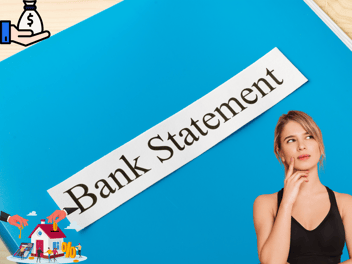10 min read

When applying for a mortgage, lenders use your bank statements to verify income, savings, and financial stability. The number of statements required depends on your loan type and income source.
-
Conventional & FHA loans: usually 2 months of statements
-
Jumbo & investment loans: often 3–6 months for added verification
-
Self-employed borrowers: typically 12–24 months under bank statement mortgage programs
Lenders review these to confirm your down payment funds, income consistency, and to spot red flags such as large unexplained deposits or frequent overdrafts.
Bank statement loans have become a go-to option for freelancers and business owners in 2025, allowing approval based on deposits instead of W-2s.
Clean, well-documented statements can make or break your approval, so prepare early and work with experts like Truss Financial Group to ensure your financials are ready.
Here’s what buying a home in 2025 or any year will require: You’ll come prepared to prove your financial life. Among the most important documents that lenders require when applying for a mortgage is the bank statement. But how many months of bank statements do you actually need to qualify for a mortgage?
The answer is contingent on the type of loan you have, your employment circumstances and your lender’s policies. If you're a self-employed borrower considering a bank statement mortgage loan, the requirements are different than those for traditional loans. In this article, we'll cover exactly how many statements you’ll need, why lenders ask for them, and what red flags to avoid.
Key Takeaways
-
This article provides a comprehensive and updated guide on how many months of bank statements are needed to qualify for different types of mortgages.
-
It covers the requirements for conventional, FHA, jumbo, investment, and bank statement mortgage loans, with special focus on self-employed borrowers.
-
Readers will learn what red flags lenders look for on bank statements and why some applicants may be asked to provide up to six months of statements.
-
The article explains how bank statement loans work and when they may be a better option than traditional mortgages.
-
It answers common questions in a clear FAQ section, providing actionable tips to help borrowers prepare their bank statements and improve their chances of mortgage approval.
Why Mortgage Lenders Ask for Bank Statements?
When you take out a mortgage, lenders want to make sure you can afford to pay the monthly mortgage this type and that you can manage your money responsibly. That’s where your bank statements come in.
Bank statements are a window into your financial life. They show:
-
If you have sufficient funds in your bank accounts for the down payment and closing costs
-
If you have a steady income that’s high enough to cover your monthly mortgage plan
-
How you handle debt, savings, and day-to-day expenses
-
If there are any suspicious activities, such as large cash deposits that aren’t explained
Lenders use this information to assess your debt to income ratio, verify steady income, and make sure you aren’t relying on undisclosed loans or gifts. Ultimately, reviewing your bank account statements helps mortgage lenders determine if you’re a trustworthy borrower.
How Many Bank Statements Are Required for Different Mortgage Types?
The number of bank statements you’ll need depends on your loan type and financial profile. Let’s break it down.
1. Conventional and FHA Loans
If you’re applying for a traditional mortgage such as a conventional loan or an FHA loan, most lenders will request two months of bank statements.
This is typically sufficient for mortgage underwriters to verify:
-
Your down payment funds are legitimate and not borrowed
-
You have enough reserves to cover closing costs
-
Your income matches what’s reported on your mortgage application
-
There are no unusual deposits or spending patterns
2. Jumbo Loans and Investment Properties
When applying for larger loans such as a jumbo loan or a mortgage on an investment property, lenders often require more documentation. In these cases, expect to provide three to six months of bank statements.
Why the extra scrutiny? Jumbo loans exceed standard loan limits, which means lenders face more risk. They want to see a longer track record of steady income and healthy savings. Similarly, if you’re purchasing an investment property, lenders want to ensure you can manage additional financial obligations.
3. How many Bank Statements for Self-Employed Borrowers?
If you’re a self-employed borrower, the traditional income verification route, pay stubs, W-2s, or tax returns, may not reflect your true earning power. That’s where bank statement loans come in.
With a bank statement mortgage loan, you typically need to provide:
-
12 to 24 months of bank statements, either personal or business bank statements
Lenders use these statements to calculate your average monthly income. They analyze consistent deposits to determine how much you actually earn without requiring traditional income documentation.
This is an attractive option for entrepreneurs, freelancers, and small business owners whose income may be substantial but not easily captured on tax forms.
Why Some Lenders Ask for 6 Months of Bank Statements
You may be wondering: why do some lenders ask for six months of bank statements, even if you’re not applying for a jumbo or bank statement loan?
Here are a few common reasons:
-
You have a complex financial profile (multiple bank accounts or inconsistent income)
-
Your credit history is limited or includes lower credit scores
-
You are applying with business bank statements rather than personal bank statements
-
The lender wants to verify that your net income is stable over a longer period
-
You’re using gift funds or non-traditional assets for your down payment
In general, the more risk your profile presents, the more documentation lenders will request to verify income and savings.
What Are Red Flags on Bank Statements?
When lenders review your bank statements, they aren’t just looking at your balances. Lenders actively search for indicators of financial instability or attempts to manipulate the system.
Common red flags include:
-
Large unexplained cash deposits
If you can’t prove the source of a large deposit, it could delay or derail your loan approval. Always document gifts or transfers. -
Non-sufficient funds (NSF) fees or overdrafts
Frequent overdrafts signal poor money management and may lead to a declined application. -
Unusual transfers between accounts
Moving money around right before applying for a mortgage can look suspicious unless clearly documented. -
Low average balances
Having just enough to cover your down payment and nothing more can indicate financial strain. -
Income that doesn’t match what was reported
If your bank statements show deposits that don’t align with your stated monthly income, the lender may flag your file for review.
It’s critical to maintain clean bank statements in the months leading up to a mortgage application. Avoid large, unexplained transactions and keep your balances healthy.
How Bank Statement Loans Work
Bank statement loans have become increasingly popular in 2025, particularly among self-employed borrowers and gig workers.
Here’s how they typically work:
-
Instead of providing pay stubs or tax returns, you submit 12–24 months of bank statements.
-
The lender calculates your average monthly deposits and uses this as your qualifying income.
-
You’ll still undergo a review of your credit report and other factors, but the focus is on your bank account activity.
-
Depending on your profile, you may face potentially higher interest rates than with a traditional mortgage.
-
The lender will require enough proof of reserves, usually a few months’ worth of monthly mortgage payments in your savings accounts or other assets.
A stated income mortgage provides flexibility for those whose income reported on tax documents doesn’t reflect their real earnings. As long as your bank statements show consistent income and healthy balances, you may qualify for a home loan based on them, even if you don’t meet conventional standards.
Does FHA Require 1 or 2 Months Bank Statements?
If you’re pursuing an FHA loan, you’ll generally need to provide two months of bank statements.
Lenders use these to:
-
Verify your down payment source and closing costs funds
-
Confirm no undisclosed debts or liabilities
-
Cross-check that your income matches your application
-
Ensure there are no suspicious deposits or recent loans that could affect approval
FHA loans are popular for first-time buyers and those with lower credit scores, but lenders still take care to verify your financial institution records thoroughly.
FAQ: Additional Questions Borrowers Ask
1. How many months of bank statements do mortgage lenders require?
The requirement varies by loan type:
-
Conventional and FHA loans → 2 months
-
Jumbo or investment property loans → 3–6 months
-
Bank statement mortgage loans → 12–24 months
For more details on how long mortgage pre-approvals last, check our guide.
Always confirm with your loan officer what your lender specifically requires.
2. Why do they ask for 6 months bank statements?
Lenders may request six months of bank statements if your income is irregular, your credit profile is complex, or you’re applying with business bank statements or for a jumbo loan.
3. What are red flags on bank statements for mortgages?
Red flags include large unexplained deposits, frequent NSF fees, low balances, unusual bank account activity, and income inconsistencies.
4. Does FHA require 1 or 2 months bank statements?
FHA loans typically require two months of bank statements to verify income, down payment, and financial stability.
Final Thoughts: Prepare Your Bank Statements Like a Pro
Understanding how many months of bank statements you need can help you prepare for a successful mortgage application. Whether you’re applying for a traditional mortgage or exploring the flexibility of a bank statement loan, proper planning makes all the difference.
Here’s how to get ready:
-
Keep your bank account statements clean and free of questionable transactions
-
Document any cash deposits or transfers clearly
-
Maintain healthy balances in your savings accounts
-
Work with a trusted loan officer who understands the nuances of bank statement loans
-
If you’re a self employed borrower, be prepared to provide 12 to 24 months of bank statements and explain your income patterns
Preparation and transparency are key. With the right documentation, you can show lenders that you’re ready for the responsibility of homeownership and land the mortgage loan that works for your financial goals.
Contact us at trussfinancialgroup.com to see if you qualify.
Table of Content

Take your pick of loans
Experience a clear, stress-free loan process with personalized service and expert guidance.
Get a quote


